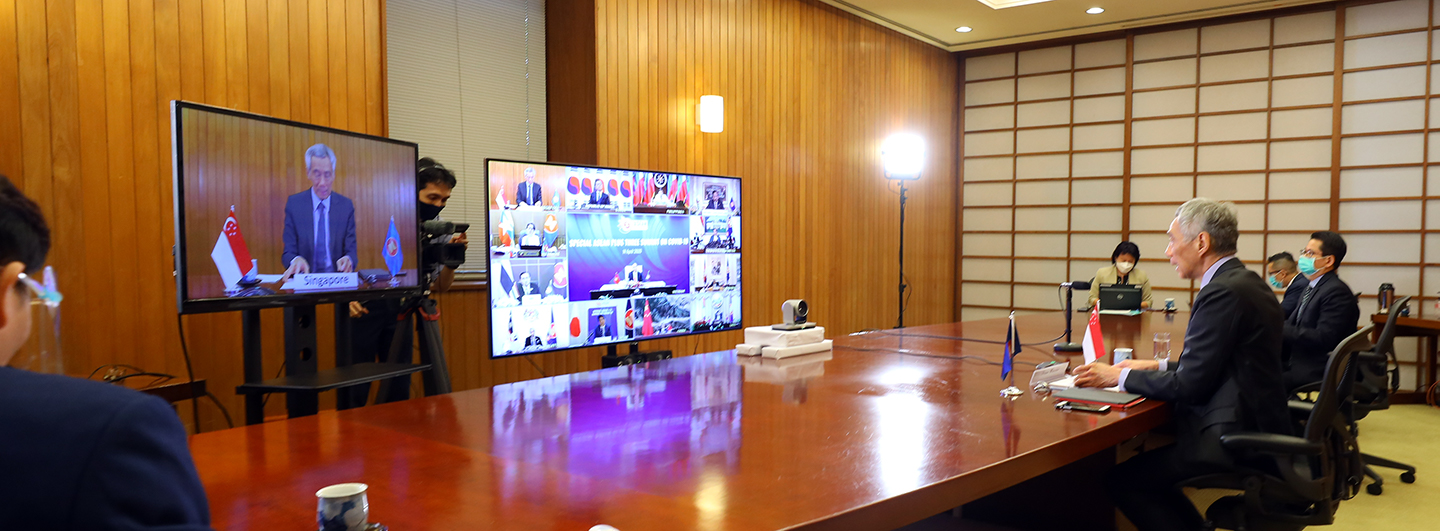Intervention by PM Lee Hsien Loong at the Special ASEAN Plus Three Summit on COVID-19 on 14 April 2020.
Your Majesty and Excellencies
When SARS happened in 2003, the members of ASEAN Plus Three came together to cooperate closely, to share information and help one another.
Now, our region faces yet another scourge in COVID-19. COVID-19 has killed many of our people and devastated our economies. Fortunately, our shared experience with SARS has given us impetus to work together to deal with this new virus. Not just by learning from one another or sharing our experiences, which our Health Ministers and officials have been doing. But also by maintaining trade, keeping supply chains intact, and donating supplies needed to fight the virus. The natural instinct of every government is to put their own people first, and to secure resources and supplies for themselves. But unless we are able to maintain trust and work with one another, our supply chains will break, production will be disrupted, and we will go back in the ultimate limit, to autarky and everyone will be much worse off.
As we cope with the public health aspects of COVID-19, we must also work together to mitigate the economic damage and find all ways to return as soon as possible to a sustainable new normal.
First, we should maintain a level of trade and economic activity, so that when the pandemic subsides, more of our workers will have kept their jobs, and our economies can recover more quickly. This is why Singapore and eight other countries, including four ASEAN Member States, recently issued a Joint Ministerial Statement affirming our commitment to keeping trade lines open and trade flows unimpeded. Singapore welcomes a similar commitment by ASEAN Plus Three countries. This would demonstrate leadership and build momentum for a global consensus on this issue.
We also have existing economic cooperation that is work in progress, in particular the RCEP. We should also sign the RCEP this year despite the adverse circumstances, to boost trade and investment flows, and affirm our commitment to regional cooperation and freer trade in a post-COVID-19 world.
Secondly, we should develop safe and controlled ways to allow the movement of people to resume. This includes how to maintain air connectivity, and when and how to lift travel restrictions, as the outbreak is gradually brought under control. No country wants to lift travel restrictions prematurely, for fear of introducing another wave of infections. But it is possible to work out bilateral or even multilateral arrangements, with necessary assurances in place, as one by one, countries bring the COVID-19 outbreak under control, and gain confidence in the success of others in the fight against the virus.
Third, we should strengthen our support for one other, using regional platforms. For instance, initiatives such as the Chiang Mai Initiative Multilateralisation, which is a significant layer of the regional financial safety net, provide market confidence and financial stability in our region. Other initiatives, like the ASEAN Plus Three Emergency Rice Reserve, enhance our food security, give confidence to our people, and remind them about the benefits of a globalised world.
We do not know when this pandemic will end, or what the post-COVID-19 world will be like, though it will surely not be a restoration of the status quo ante. But COVID- 19 is neither the first, nor the last crisis that will befall us. I hope that this videoconference will spur more cooperation between ASEAN and the Plus Three countries to address COVID-19. I welcome the proposals that China, Japan, and the ROK have put forward on combating COVID-19. Besides their immediate impact, these will strengthen the region’s ability to respond to future challenges. With this spirit of collaboration, I am confident that we will emerge from this crisis stronger together
Thank you.
Explore recent content
Explore related topics

